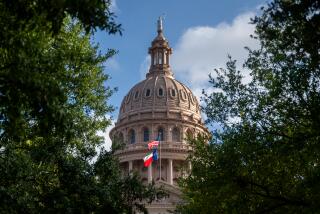The Lone Star of Texas Will Join the Other States
- Share via
AUSTIN, TEXAS — The oil bust is horrendous for Texas; so was the agriculture bust that preceded it and the real estate and banking busts that will follow. But economic lifeblood will seep back into the state sooner or later. Knowing this, most people here are down but not despairing. They realize there may never be another 1981, but also that every year won’t be as bad as this one.
When times are better, though, Texas will be a very different place from what it was before. Its old political Establishment will have fallen, and it will never come back.
For most of this century Texas has been a one-party state ruled by a self-confident, self-perpetuating business-government oligarchy that was peculiar to no other place in this country. The political leaderships of other solidly Democratic Southern states were too preoccupied with the Lost Cause to have much economic clout; Texas, more western in spirit, always cared much more about growth than segregation.
To the extent that there was a liberal tradition in Texas, it was rooted not in an industrial working class, but in populist farmers and independent businessmen--people whose dream was to use government to create economic conditions that would help them and hurt Wall Street. Texas’ fierce liberalism during the Depression was easily transformed into the Democratic conservatism of Lyndon B. Johnson, Sam Rayburn, John B. Connally, and Johnson’s highway-building friend George R. Brown. These people conquered Washington, and used their influence to send the goodies of government (defense contracts, the oil depletion allowance, farm subsidies) back to Texas. Many farmers’ and shopkeepers’ sons back home got rich, and they plowed some of their gains back into the conservative Democratic political machine.
The conservative Democrats’ greatest monument was the University of Texas. It was populist (almost anyone could get in), practical-minded (many more business majors than liberal-arts students), ambitious and completely enmeshed in state politics. The university aggressively sought government money and dispensed its riches to political and business allies in the form of construction contracts. Country boys and girls used “UT” to get on in the world; business used it as a supplier of personnel and legislators; alumni used it as a locus for deal-making. That, in the old Democratic view, was how the world should work.
The boom of the ‘70s was what fatally weakened the conservative Democrats. People streamed into Texas who hadn’t grown up under the old system and who often were--and remained--Republicans. Times were so good that people began to forget the old gospel of government and business working in concert--they began thinking that the pure free market was all Texas needed. In 1978, the state elected its first Republican governor since Reconstruction, an obstreperous oil field entrepreneur named Bill Clements. Meanwhile, the old lions in Washington died, were deposed by the Watergate class in Congress or (in the case of Connally) switched parties.
In 1982, with the first phase of the oil bust just begun, the free market seemed less perfect and the Democrats swept back into control of the state government. But it wasn’t like the old days. There was a substantial and growing Republican presence in the state legislature, and the new Democratic state officials were either more liberal or more media-oriented than would have been permitted in the past. In 1984 the Reagan landslide carried party-switcher Phil Gramm into Texas’ first Republican Senate seat in this century. Conservative Democrats began to talk gloomily about how no Democrat could ever win statewide office during a presidential election year.
The conservative Democrats know exactly what to do about the economic crisis of the moment in Texas. Their cure is that old time religion: Pass a tax on imported oil in order to keep the independents in business. Give agribusiness some emergency subsidies, in the form of either price supports or debt relief. Bend the rules for Texas banks so they can have longer to work out their bad debts. Forget about tax reform, which will hurt the real estate industry. Send more foreign aid to Mexico, which will help the economy of South Texas. Throw in a few defense contracts for good measure.
The trouble is that Texas can no longer get any of this done in Washington, notwithstanding the Texas-based presences of George Bush and James A. Baker III. The oil tax seems dead. Tax reform is alive and well. The defense budget is being trimmed. Congress will soon pass a law that will allow big New York banks to buy failing banks in Texas--and the rumor is that two of the Big Four Texas banks will be sold soon after. Even within Texas, there isn’t the kind of universal consensus about getting help from Washington that there would have been a generation ago.
To the average Texan, the lack of an oil import tax and a bank bail-out won’t make any difference. It will make a tremendous difference, though, to what remains of the conservative Democratic Establishment. Any Establishment needs an economic base; Texas’ was independent oil, local banks, big farmers and the big law firms.
After Texas recovers--without a bail-out of Texas business from Washington--Exxon and Citicorp will have taken ground from Texas-based oilmen and bankers, and those multinational giants have no interest in supporting a 1950s-style Texas oligarchy.
It is very hard to argue convincingly--though conservative Democrats try--that the death of the Texas Establishment will hurt Texas. What it will do is make Texas less distinctive and more like other places, with national institutions (notably, the two parties) instead of odd local ones dominating the state. Texas used to be the biggest real subculture within the United States; not only was it remote, but there were different rules and customs and ways of doing things too. Those days are over now.
More to Read
Get the L.A. Times Politics newsletter
Deeply reported insights into legislation, politics and policy from Sacramento, Washington and beyond. In your inbox twice per week.
You may occasionally receive promotional content from the Los Angeles Times.










